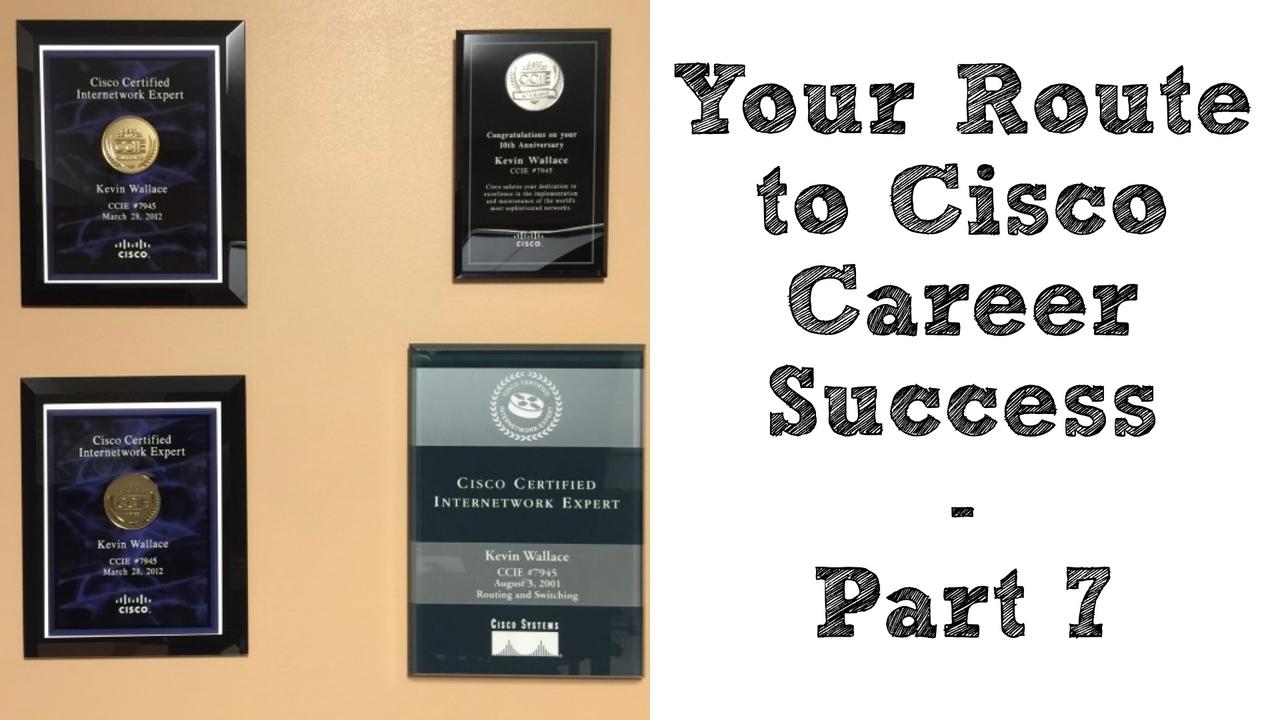Your Route to Cisco Career Success – Part 7: A Certified Success
Mar 07, 2016

Having the appropriate Cisco initials after your name (e.g. CCNA, CCNP, or CCIE) is a shortcut way of letting someone know your relative skill level. Even if you’ve got the skills and are at the top of your game, you still might be passed over when you’re looking for a new job, because that new job explicitly requires a specific certification. For many Cisco professionals (including me), earning certifications is less about impressing others and more about pushing yourself, to see how good you really are and what you’re capable of. I always get a rush when attaining a new certification and start thinking about what’s next. Also, if you’re a consultant, having a nice collection of Cisco certifications is an instant way to establish credibility with potential clients. You could even use your hard-earned credentials in your marketing materials.
The Spectrum of Cisco Certifications
Hopefully, you’re convinced that earning certifications is a worthy goal for Cisco professionals. However, which certifications should you go after? First, let’s identify the different levels of certifications. (NOTE: Please keep in mind that Cisco regularly makes updates to their certification tracks. So, for the latest information, visit: http://www.cisco.com/c/en/us/training-events/training-certifications/certifications.html)
Entry Level
Someone with an entry level certification is expected to be able to install, operate, and troubleshoot small networks. At the time of this writing, Cisco identifies two entry level certifications:
Associate
Several associate level certifications exist, focusing on different disciplines. While specific qualifications vary among the various associate level certifications, someone with one of these certifications is expected to be proficient to work with the corresponding technology in a mid-sized network. Cisco currently identifies the following certifications at the associate level:
- Cisco Certified Design Associate (CCDA)
- Cisco Certified Network Associate (CCNA) Cloud
- CCNA Collaboration
- CCNA Data Center
- CCNA Industrial
- CCNA Security
- CCNA Service Provider
- CCNA Wireless
- CCNA Routing and Switching
Professional
Like the associate level, the professional level of Cisco certifications span a variety of technical disciplines. In general, someone with a professional level Cisco certification is expected to be able to work independently, in their area of focus, on complex networks. Cisco currently lists the following as recognized professional level certifications:
- Cisco Certified Design Professional (CCDP)
- Cisco Certified Network Professional (CCNP) Cloud
- CCNP Collaboration
- CCNP Data Center
- CCNP Routing and Switching
- CCNP Security
- CCNP Service Provider
- CCNP Wireless
Expert
Cisco offers expert level certifications in a variety of technologies, and those who possess these certifications are widely regarded as experts in their field. Cisco currently has the following expert level certifications available:
- Cisco Certified Design Expert (CCDE)
- Cisco Certified Internetwork Expert (CCIE) Routing and Switching
- CCIE Collaboration
- CCIE Data Center
- CCIE Security
- CCIE Service Provider
- CCIE Wireless
Architect
Currently, Cisco has a single certification at the architect level. That certification is the Cisco Certified Architect (CCAr). This certification represents the highest level of Cisco certification. Only a handful of Cisco professionals have ever reached this level. Cisco won’t even say how many people currently have the certification. My personal guess (and this is just a guess) is that no more than 40 people in the world have achieved this certification. Those with the coveted CCAr certification are not only expected to be able to design complex global networks but also translate a company’s business strategies into corresponding technical strategies.
While the certifications listed here represent Cisco Career Certifications, Cisco does have other Specialist Certifications. You can learn more about those HERE.
Cisco professionals often ask me what certification track they should pursue. My recommendation to you is to focus on technologies you’re interested in, rather than the technologies you perceive to be currently in demand.
The Psychology of Certification
Previous blog posts in this series addressing topics such as goal setting, understanding Cisco documentation, getting your hands on equipment, and time management, are directly applicable to our discussion of certification. For example, you need to start with a goal to earn a specific certification, and then manage your study time, while dealing with life’s distractions. However, beyond the mechanics of earning a certification, there is a good bit of psychology involved. For example, have you ever been taking an exam and get panicked?
Many certification candidates (including me) have. So, let’s take a look at a few quick tips for managing your emotions.
Yawning

You’re sitting there at the testing center (or at a CCIE lab facility). You’ve invested many hours preparing, and you or your company have invested money for you to take this exam. This causes a serious case of nerves in many certification candidates. Certainly, not everyone gets nervous, but many do. Here’s a quick tip to calm the nerves.
It’s something I learned from watching the Winter Olympics several years ago. Apolo Ohno (who has recently gone onto even more fame as a contestant on Dancing with the Stars) was a short track speed skater for the USA. Before his races, I noticed he always yawned. This struck me as odd. I mean, he’s at the Olympics, is he bored?! Then, one of the television commentators explained what he was doing. Apolo intentionally yawned before his races to calm his nerves. The act of yawning helps release tension in your facial muscles and gives you a nice intake of oxygen. I’ve tried it, and it works for me. So, if you find yourself tensing up in an exam environment, try a couple of slow and relaxing yawns.
Striking a Power Pose
Recently, I was reading the book Presence by Amy Cuddy, which led me to go watch her TED Talk. Please take about 20 minutes, and go watch it for yourself. It will be a great use of your time, but let me just share with you the bottom line.
Before going into your certification exam, find a place (maybe in a restroom) to stand with a power pose for two minutes. A power pose is one in which you stand (or sit) with your arms opened up (e.g. like Wonder Woman or like someone holding their hands up in victory, because they just won a race). By striking this kind of power pose, research shows that on average, your Testosterone levels will rise by 20 percent, and your Cortisol levels will drop by 10 percent.
Testosterone is your dominance hormone, and Cortisol is your stress hormone. This means, by just taking two minutes before an exam to assume a power pose, you can increase your confidence and decrease your stress, not a bad state to be in when entering the exam room.
Making Investigative Attempts
One of my fellow students in a CCIE Voice boot camp I attended referred to his first attempt at a CCIE lab as an investigative attempt. Let’s face it, the odds are not good. Most CCIE tracks take about three to four attempts on average to pass. However, this guy didn’t go into the lab, on his first attempt, with the anticipation of passing. Instead, his purpose for being in the lab was to learn how the lab was setup, what types of tasks faced him, and how quickly he had to move through the tasks to get done. Sure, he had put in hundreds of hours of study in preparation for this first attempt, and he very well might pass. However, he mentally took away the pressure of passing by convincing himself that his primary goal was to investigate what the lab was like, so that he could come back and pass on a future attempt.
You might want to adopt this attitude the next time you’re facing a particularly challenging certification exam. Certainly, I’m not suggesting that you do less preparation than you otherwise would, and take an exam just to see what’s on the exam. You should thoroughly prepare before your first attempt. However, if you’re taking a CCIE lab or a really tough exam, you might have the mindset that: You’ve prepared. Given the right set of questions or tasks, you’re going to pass. You’re committed to eventually passing this exam, and you might pass this first time. However, you’re primary goal on this first attempt is to investigate what’s on the exam.
Skipping Questions (or not)

When in the midst of an exam, you might be faced with a particularly challenging or lengthy question or task. A question many exam candidates have at that point is, “Should I skip this question, just making my best guess and moving on, or should I stick with it until I’ve figured it out?” As you’re going through different Cisco certification exams, some questions will be tougher than others. On a written exam, you might have simulations. You might have a massive amount of output (e.g. debug output) you have to read through. The fact is, some questions take longer to answer than other questions. If the exam is one of those where you barely have enough time to get through all of the questions, it’s sometimes wise to skip a question, or make your best guess, and move on.
I was taking an exam, and there was a huge amount of debug output on the screen for me to wade through, in an attempt to determine what was causing the troubleshooting issue described in the question. There was so much output on the screen, the exam even provided a search feature, where I could search for particular character strings in the output. I realized it was going to take a very long time to go through all of that output. However, I thought that I’d done well enough on the other questions to probably still pass, without burning through the ten to fifteen minutes it would take me to answer this one question. So, I skipped it. Well, I didn’t really skip it. I made an educated guess based on the wording of the question and the available answers in the multiple choice question.
The moral of the story is this. Sometimes it’s better to strategically skip a question, if skipping that question will allow you time to answer other questions you otherwise would not have time to answer. What I do at the beginning of a written exam is determine, on average, how much time I have to complete each question.
For example, let’s say that at the beginning of an exam there’s a screen stating that there are 60 questions on the exam and a 90 minute time limit. Some quick math (i.e. 60 / 90 = 1.5) reveals that, on average, you have about one and a half minutes to complete each question. Then, 30 minutes into the exam, and again at the 60 minute mark, you check your pace. For example, let’s say that you’re 60 minutes into the exam, and you’ve answered 50 questions. This means that you’re spending an average of 1.2 minutes (i.e. 60 / 50 = 1.2) on each question. So, you’re ahead of pace and can afford to spend a little extra time if you come upon a particularly challenging question. However, if you’re 60 minutes into the exam, and you’ve only answered 40 questions, you’re spending an average of 1.5 minutes (i.e. 60 / 40 = 1.5) on each question. So, you don’t have any extra time to spare. If you encounter a question you believe will take you longer than 1.5 minutes, you might just want to make your best guess, and move on.
A Tale from the Trenches
While writing this blog post, and thinking about the whirlwind of emotions that often accompany an exam attempt, I was reminded of the evening before my second attempt at the CCIE Voice lab. Sitting in my hotel room in RTP North Carolina the evening before the lab, some less than empowering questions made their way into head. What if I fail? What if I’ve put in all this effort, spent all this money, took away irreplaceable time from my family, and have nothing to show for it?
Then, I remembered my favorite quotation from Theodore Roosevelt. It was a quote that I framed and had hanging in my office for years. The quote goes like this:

It is not the critic who counts; not the man who points out how the strong man stumbles, or where the doer of deeds could have done them better. The credit belongs to the man who is actually in the arena, whose face is marred by dust and sweat and blood; who strives valiantly; who errs, who comes short again and again, because there is no effort without error and shortcoming; but who does actually strive to do the deeds; who knows great enthusiasms, the great devotions; who spends himself in a worthy cause; who at the best knows in the end the triumph of high achievement, and who at the worst, if he fails, at least fails while daring greatly, so that his place shall never be with those cold and timid souls who neither know victory nor defeat.
– Theodore Roosevelt
Suddenly, I was comforted, knowing that no matter what happened in the lab the following day, I had spent myself in a worthy cause. I had known the great enthusiasms, the great devotions. If I passed, then I would know the triumph of high achievement, but if I failed, I would do so while daring greatly. My place would never be with those cold and timid souls who know neither victory nor defeat.
The next day, I entered the arena. I was fortunate to pass and to know the triumph President Roosevelt spoke of. He referred to this complete devotion to a cause as being in the arena. I invite you to join me there.
NOTE: This is the final installment in the Your Route to Cisco Career Success series. If you missed any of the first six postings, you can check them out here:
Your Route to Cisco Career Success – Part 1 (Goals: Your Destination Address)
Your Route to Cisco Career Success – Part 2 (When Life Gets in the Way)
Your Route to Cisco Career Success – Part 3 (The Curiosity Key)
Your Route to Cisco Career Success – Part 4 (Time Alchemy)
Your Route to Cisco Career Success – Part 5 (Tomes of Wisdom)
Your Route to Cisco Career Success – Part 6 (Getting Your Hands Dirty)

Kevin Wallace, CCIEx2 (R/S and Collaboration) #7945, CCSI #20061
If you enjoyed this article, you might also want to subscribe to my podcast:
iTunes: http://kwtrain.com/podcast



